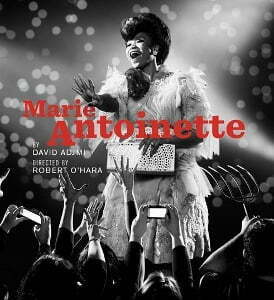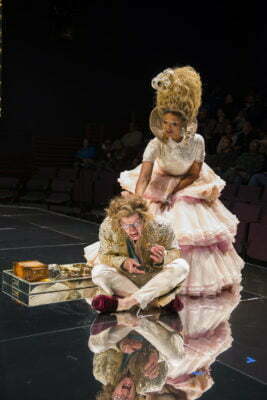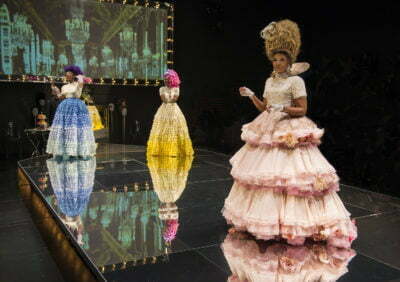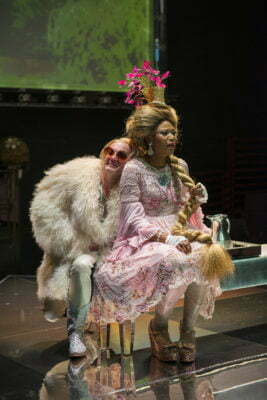Marie Antoinette
Directed by Robert O’Hara
Produced by Steppenwolf Theatre Company
France’s Queen as Shallow as She’s Ever Been
Imagine a tragic hero. Some individual whose pride and circumstances push them into a horrible situation, yet who finds the meaning of life in struggling for the principles at the core of their personality. Now imagine such a person without any principles, education, refinement, intellect, comprehension, or agency, and you have David Adjmi’s Louis XVI and Marie Antoinette. In a Chicago premiere, Steppenwolf presents us with a mechanical revolution that moves the royals to their inevitable downfall with the certainty of gravity.
Alana Arenas plays the queen. An example of one of her lines from early in the play is “Maybe they are starving. I hear things, but then I think maybe it’s all a canard? Human relations are so confusing, they should be transparent and they aren’t.” Her delivery is perfect, capturing all the character’s clueless banality, helplessness, pomposity, and indifference, and she keeps it up throughout the play. Tim Hopper plays her husband, here a lugubrious man-child interested only in tinkering with clocks. However, Hopper cannot help but add some dignity to a role that was not written to have any. Together, the events of 1776–1793 happen to them, and one of the major problems of the play is that despite being absolute monarchs, they don’t seem to really do very much.
Naturally, Adjmi emphasizes some events over others. For much of the first act, Marie Antoinette tries to persuade Louis to get circumcised to fix their trouble conceiving an heir. In this, she is assisted by her brother, Emperor Joseph (Keith D. Gallagher), who is rather unimpressed with how they’ve been running a country. The affair with the diamond necklace is glossed over, but a sheep (Alan Wilder, having fun) appears in Marie Antoinette’s “peasanty” retreat to warn her of the poetry being written against her. Her friends (Tamberla Perry and Ericka Ratcliff) try to keep her spirits up, but the situation becomes steadily direr. Early in the play she flirted with a handsome Swedish nobleman (Ariel Shafir). By the end, she languishes under the cruelty of her fanatical jailer (Tim Frank), which finally provokes her to rage and madness. Along the way, she acquires and loses a family along with her other possessions.
The biggest strength of this production is the design. Clint Ramos has made the stage into a mirrored runway, with screens on the wall at either end that play a museum-like informational video on Versailles at the top of the show. Costume designer Dede M. Ayite and hair and make-up by Dave Bova deck out everybody, but especially the queen, in a visual feast of anachronisms. Marie Antoinette’s dress in the first scene could almost be period, except for having the word “boss” emblazoned on the chest in rhinestones. Louis, by contrast, always looks disheveled even in his gold robe. Several characters wear richly embroidered or patterned velvet that mixes the ostentation of the ancient regime with modern fashion. There is a genuinely funny moment when we see what Marie considers a peasant disguise. During scene changes, Jeff Sugg’s projections display loving shots of Marie’s glamor accompanied by French hip hop compiled by Lindsay Jones to create the impression of a music video. At times, these videos provide narration and loud booms that emphasize tumultuous events in a deliberately blunt style.
However, Robert O’Hara’s direction falters in some places. The characters notice themselves moving in a circle for no purpose in the first scene, and some things like the Dauphin who appears onstage being Marie’s younger son after the first one died aren’t completely clear. O’Hara successfully communicates his vision of the royal couple as exhibits. I enjoyed a trick of the projections in which live video of the actors is overlaid with an image of the palace windows, like we are peering in. However, the artifice never breaks down enough to let emotions through. There is a moment late in the play when Louis sings to his family while they are hiding during the September massacres. It could have been a moment to humanize them and gain some sympathy, but the scene goes by too fast and Marie’s response is too cutting.
Despite the rich design and committed actors, the show lacks stakes because the characters are too passive. Steppenwolf’s production team made clear the point of the show is to draw a parallel between Marie Antoinette and contemporary celebrity entertainers, hence the hip hop and glam. But that basically misunderstands her and the French Revolution’s place in history. If anyone today is similar to Marie Antoinette, it is the likes of Asma Al-Assad, Imelda Marcos, and Patience Jonathan, not Kim Kardashian. Entertainers don’t have any power and only make what people are willing to pay them, but Versailles was built on global tyranny. Forcing that comparison requires the Bourbons to be completely harmless and makes more of an issue of how they spent their money than how they obtained it, which is neither insightful nor compelling drama.
Somewhat Recommended
Jacob Davis
Reviewed February 14, 2015
For more information, see Marie Antoinette’s page on Theatre in Chicago.
Playing at Steppenwolf Upstairs Theatre, 1650 N Halsted St. For tickets, call 312-335-1650 or visit Steppenwolf.org. Tickets are $20-86. Plays through May 10, Tuesdays-Saturdays at 7:30 pm, Saturdays and Sundays at 3:00 pm, Sundays at 7:30 pm through April 19, and April 22, 29, and May 6 at 2:00 pm. Running time is two hours and ten minutes with no intermission.




